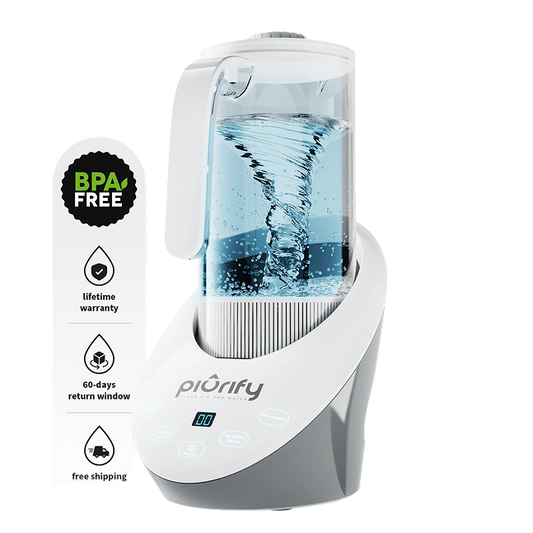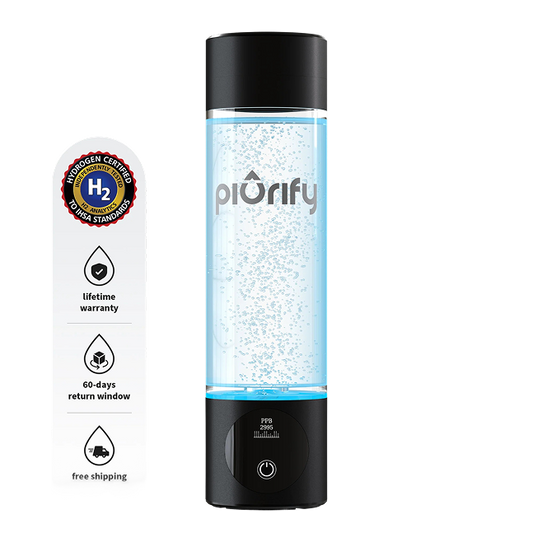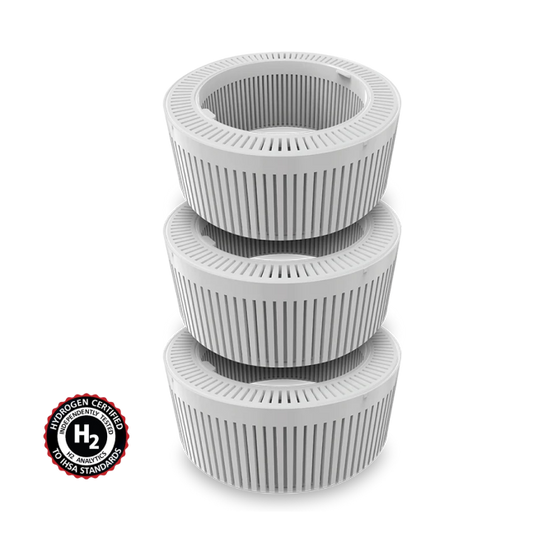Does Being Hydrated Help You Sleep?
The tossing, the turning, the frustration. Is there anything worse than a sleepless night when you just want to get a good night’s rest? If you’re not sleeping well and aren't sure why, the answer might be as simple as how much water you’re drinking throughout the day. While you might not have thought about it before, dehydration and sleep are more closely linked than you realize.
The Importance of Hydration for Sleep
During the day, staying hydrated improves your brain function and cognition. Adequate fluid intake helps to improve focus and energy levels and wards off migraines. Going to bed hydrated means that you’re less likely to have brain fog and headaches, which can help you have a more restful sleep.
Dehydration and lack of sleep can be a vicious cycle. Even mild dehydration can throw off your body’s natural rhythm, which results in bad sleep and feeling sluggish the next day. Sleepiness during the day then leads to higher chances of dehydration during the daytime. The key is to make sure you’re hydrating during the day to avoid this pattern at night.
Do You Lose Water While You Sleep?
Yes – your body loses water all time, including when you’re asleep. Here’s how your body expels water:

The link between dehydration and sleep deprivation is real since your brain takes its cues from your hydration status. When your body temperature starts to rise, like when you’re sleeping in a hot room, you’re brain sends a message to your body to create sweat to cool you down. Night sweats over a period of time can lead to fluid loss.
You can lose around 200 ml per night – but this figure increases if you have thick bedding, you're unwell, or live in a warmer climate. Sleeping in high temperatures is also uncomfortable, so experts recommend an environment that’s between 60°F and 70°F.
On average, you lose between 200–300 ml of water through respiration over approximately eight hours of sleep (which is the perfect amount of sleep for many!).
If you breathe through your mouth or snore, you may lose even more water while sleeping (which is a reason why many snorers wake up with a dry mouth).
To fight this, you can drink water in the hours leading up to bedtime, but be careful not to drink too much, as waking up at night to use the bathroom is another sleep disruption.
How Does Dehydration Affect Sleep Quality?
Dehydration doesn’t just make you feel tired—it directly affects the quality of your sleep.
Research shows that if you're dehydrated you’re less likely to sleep well and experience quality sleep throughout the night.
A large study (published in SLEEP) found that adults who slept six hours or less had significantly lower hydration levels than those who slept eight hours. That’s partly due to vasopressin, a hormone released during deep sleep. Vasopressin helps your kidneys retain water so you don’t wake up thirsty.
If you’re dehydrated – or if you wake up repeatedly – your body doesn’t release enough vasopressin. This leads to:
- Dry mouth and throat
- More frequent awakenings
- Morning dehydration
- Fragmented sleep cycles
The Link Between Sleep Disruptions and Dehydration
Poor sleep quality or a shorter sleep duration are linked to higher chances of dehydration. In fact, people who sleep poorly and feel fatigued or have headaches in the morning may find that dehydration is actually the culprit, not just the lack of sleep.
This may go back to the hormone vasopressin. At night, your pituitary gland uses this hormone to tell your kidneys to hold water in, releasing more of it later in your sleep cycle. If you wake up early or frequently, less vasopressin reaches your kidneys. This means your kidneys don’t get the message to hold in water and you can wake up dehydrated.
How to Improve Sleep and Hydration
So, how can you improve both your sleep and enhance your hydration at the same time? Here are our top 5 tips for improving sleep and hydration:
- Drink consistently throughout the day. Avoid “catching up” on water right before bed.
- Use your hydration target. Aim for around 35ml per kg of body weight spread across the day.
- Limit water 1 hour before bed. This gives enough time to hydrate without triggering bathroom visits and can avoid too much water retention.
- Be mindful of caffeine and alcohol. Both increase fluid loss and can worsen sleep.
- Hydrate smartly. Hydrogen-infused water can elevate daily hydration by delivering powerful antioxidants.
Finding the Right Balance (Don’t Drink Too Much!)
Going to bed dehydrated can cause issues, but going to bed too hydrated can lead to disturbed sleep. Here are some potential risks of drinking too much water before bed:
-
Frequent bathroom trips – Drinking too much can wake you multiple times, breaking your sleep cycle.
-
Overhydration risks – Excessive water intake can dilute electrolytes in the body, affecting overall health.
Timing matters, so aim to finish most of your water intake at least an hour before bedtime.
Most experts recommend drinking a modest amount of water before bed – around 4 to 8 ounces (120 to 240 ml), within 1 to 2 hours before bedtime.
The key is steady hydration throughout the day, rather than trying to “catch up” at night. This way, you wake up refreshed, without the need for extra fluids during the night.
Benefits of Drinking Water Before Bed
Drinking a moderate amount of water before you sleep can actually help your body in several ways. Here are the key benefits of drinking water before bed:
-
Prevents morning dehydration – Even mild dehydration overnight can leave you feeling groggy or give you a headache.
-
Supports detoxification – Your body continues to filter and process toxins while you sleep, and water helps this process.
-
Maintains skin hydration – Staying hydrated overnight helps skin cells regenerate, supporting a healthy complexion.
-
Reduces cramps and stiffness – Muscles need water to stay flexible; proper hydration can help prevent nighttime cramps.
Hydrate Smarter with PIURIFY
If you want deeper, more restorative sleep, improving hydration is one of the simplest steps you can take.
The PIURIFY Hydrogenator Bottle infuses water with hydrogen, giving it antioxidant properties that support your overall well-being, including sleep quality.
Get a better night’s rest today with PIURIFY.
Frequently Asked Questions About Hydration and Sleep
How does dehydration affect sleep?
Dehydration can affect your sleep pattern and wake you up during the night.
What are the signs of waking up dehydrated?
If you wake up feeling immediately thirsty, have muscle cramps, a headache, or dry skin, you should start drinking water to rehydrate.
Can drinking more water help you sleep better?
Your body doesn’t rehydrate as you sleep, which is why it’s even more important to hydrate throughout the day. Setting a hydration goal and schedule can make rehydration easier to remember and achieve.
Does dehydration cause snoring or sleep apnea?
Dehydration can cause your mouth and throat to dry out and thicken your mucus, which makes it harder to breathe and can lead to snoring. Chronic dehydration has also been linked to sleep apnea, a sleep disorder that causes you to stop breathing during sleep.
How does dehydration affect sleep quality as we age?
While not a direct link, research shows that older adults sleep for shorter periods and have more sleep disruptions. Shorter sleep duration is associated with dehydration.
Is it possible to rehydrate during sleep?
Your body doesn’t actively hydrate during sleep, but hydrating well before bedtime can help you retain more water overnight.
Do electrolytes help you sleep?
Your body needs electrolytes to rehydrate. While sports drinks and hydration enhancers can help after workouts, there’s no need to replace water with a sports drink before sleep.


